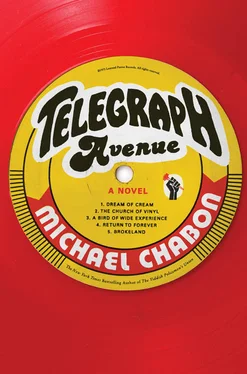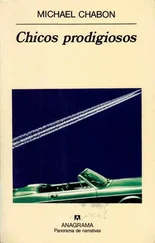“Loudness,” she cautioned him. “Volume.”
“I was going to see if he’s at Mrs. Wiggins’s. So I looked, and his bike is in the bushes. But then I thought, I don’t know. That maybe he might be here.”
“Here?” She shook her head, looking closer to smiling than he had yet seen her. “Not here.”
“I mean, you don’t know . He could have sneaked in. Titus has skills.”
“Look at me, occult investigator,” she said. “You think because I am old, stupid, deaf, and Chinese, some boy can sneak and hide in my house and I don’t know it?”
“No,” he guessed.
“You must be a really lousy occult investigator.”
“Kind of.”
“I think ghosts are laughing at you.”
“Probably.”
“No ghost here,” she said. “Your friend went to his house. Go look there, tell him, ‘Little brother is coming.’”
“Yeah, but what about,” lowering his voice, glancing up and down Telegraph, “that room you have?”
“No room.”
“No, the, like, secret bedroom? The door that’s hidden behind a poster of Bruce Lee? Where Gwen was staying. Gwen Shanks.”
She blinked and handed him back his card. “No ghost. No ghost room. Good luck. Goodbye.”
Julie thought about trying to slip past this annoying old person. Run upstairs, take a look for himself in the room that was behind the Bruce Lee door. He turned away, dropped his board to the sidewalk, stepped onto the deck. Hesitating, trying out a different kind of move.
“Oh, uh, you taught Luther Stallings, right?” he said. “From the movies. My friend, Titus? He’s Luther Stallings’s grandson.”
She came out in her gray gi and black sandals, skinny and featherweight with the walk of a younger person. “Let me see this ghost bicycle,” she said.
Julie led her around the side of the building to the parking area. They crunched across the gravel over to the Dumpster. He pushed aside tangles of honeysuckle, covered in flowers like a scattering of buttered popcorn. The heavy fragrance of the flowers mingled with the rancid atmosphere of the Dumpster. Before Julie could help or prevent her, she grabbed the handlebars of Titus’s bicycle, tugged it out of the tangling vines with surprising ease. She seemed to regard the bike’s presence as something of an offense, but there was also, Julie thought, a touch of puzzlement; even, possibly, of wonder. She looked sidelong at a small, square window at the top of the building—it was open, though there was no obvious way to climb up to it—then back down at the bicycle.
“Weird bike,” she said.
“It’s called a fixie?” Julie said. “No brakes. No gears. You just pedal it. When you want to stop, you have to pedal the other way.”
She climbed on the seat, gripping the handlebars, pedaled forward slushing through the gravel, fingers fluttering to find hand brakes that were not there. She slammed backward on the pedals, stopped, ground forward till she hit sidewalk. For three seconds she wobbled on the bike like a kid fresh from training wheels, a frail knot of bone, tendon, and gray silk. By the fourth second, she had figured out how to pedal backward, weaving away heedless down the sidewalk without looking over her shoulder. She disappeared behind a high fence. Ten seconds later, she reappeared, pedaling forward, and gestured curtly with one hand, master of the fixie now and for all time. “Come on,” she said.
“Come on, where?”
“Miss Wiggins. Look for your friend. Mr. Occult Investigator, scared of ghost house. That’s why you come here first. Talking about some lamebrain idea, a fourteen-year-old boy could sneak into the Bruce Lee Institute and I don’t know about it. You came here because you are afraid to go there. Right or wrong?”
“Right,” Julie said. “Basically. But seriously, Titus does have skills.”
“Insult me one more time,” she said, “I don’t go with you.”
He got on his skateboard and they set off, the lady tearing down the sidewalk with such impossible energy, such abandon, that Julie could not keep up. She stopped and waited for him, gesturing toward her shoulder with her chin. He took hold of it. It was rope and bone.
She towed him down to Forty-second Street and turned the corner. They rode past Mr. Jones’s, the house looking empty and forlorn. On the porch stood the perch where Fifty-Eight used to sit, empty, abandoned. She pedaled on, rolling toward the door of the house where Titus’s auntie moldered like some ancient monarch whose kingdom had gone to lawlessness and ruin. The lady—she’d said to call her Mrs. Jew—hoisted the bike and rolled it up the crumbling front steps of the porch. She pounded on the door, bang! bang!
“Titus,” she told the young man who opened the door, eighteen, nineteen, pop-eyed and heavy-jawed, with a frowsy tangle of chin beard. Shirtless, lean-bellied, his skin blotted with unreadable, uninterpretable tattoos. The elastic of his boxer shorts and an inch of dark blue lozenges on light blue background emerged from the waistband of his knee-length denim shorts.
“Titus,” Mrs. Jew said again.
The young man gardened at his chin beard with two fingers. Julie lingered on the bottom step, feeling exposed and dangerously faggoty in his short shorts and his sleeveless T-shirt. From the open mouth of the house came a steady exhalation of marijuana and a low rumble of television, maybe a football game. There were voices, too. Not angry or hostile. Just voices. People talking, laughing.
“I teach kung fu,” Mrs. Jew said.
“Kung fu ?”
“Bruce Lee Institute. Around the corner.”
Julie remembered his father telling him once about how when Julie was little and he would go around the neighborhood wearing his little Batman or Spider-Man costume year-round, people used to think he was cute and all. But when he went around the block dressed up like Superman, people would light up . Over and above the cuteness of some little dude masquerading around all solemn-face in the gaudy S-suit, there was something about the idea of Superman that made people happy. It was probably like that when you mentioned Bruce Lee.
“Bruce Lee,” the young man said. “He really was a student there?”
“I was his teacher.”
“For real? You?”
“I kick his ass,” said Mrs. Jew. “On a daily basis. ”
“Yo,” the young man called, glancing over his shoulder into the house. “Where Titus at?”
Somebody said something, and the man stepped aside. It was easily accomplished, without violence, subterfuge, or even use of the word “please.” Julie felt ashamed of his trepidation and anxiety, but he did not renounce them as he followed Mrs. Jew into the house. It was old and cramped, maybe kind of charming once upon a time. The fireplace mantel had that medieval feel you saw in a lot of little bungalows. Handsome columns of painted wood held up the ceiling here and there. The living room was all about the television, an old rear-projection number whose sun-dimmed display struggled to contend with the color palette of The Fresh Prince of Bel-Air. Three teenage boys and two girls on a sectional tartan-plaid sofa repaired with accumulated yards of silver duct tape. On the floor a girl about Julie’s age, in a Catholic-school skirt, and four or five little kids. The girl looked more Latina than black to Julie, and one of the little kids was almost white, with drifts of reddish-brown curls. Across from the plaid sofa, a young man in a wheelchair breathed air from a green steel tank. He laughed into the plastic breathing mask. An empty bag of spicy Cheetos lay on the floor. On the coffee table stood two large bottles of Coke. A pizza box. A plastic tub that once held Trader Joe’s animal crackers. It was messy, dirty, crowded, and there was a miasma of Cheetos, but mostly, it was a bunch of kids sitting around watching a show that Julie also enjoyed. He had been expecting strobe lights, peeling wallpaper, people passed out on the floor, the flash of crack pipes. Twenty-four-hour pounding of woofers. Baleful people, he thought, lurking in the corners of shadowy rooms.
Читать дальше
Конец ознакомительного отрывка
Купить книгу












